If you’re reading this article, you’ve likely either decided to use logging to achieve your weight management goals, or you’re interested in logging, but you want to first make sure the efficacy of logging is supported by the current evidence. In our attempts at weight loss, we often assume that jotting down our meals or measuring weight will serve as a reliable way to obtain predictable results. However, it’s worth asking: does evidence actually support the idea that logging advances our efforts? Are we misguided in tracking our morsels? Or, does the logging process itself teach us that recording is not merely a ledger, but an edge to achieve what we want?
This article explores not just the question of if we should be logging, but also whether certain types of logging increase our probability of successful weight loss.
Defining logging
Before we dive into the research, let’s establish some key definitions for clarity. This article zeroes in on two main activities: logging dietary intake and scale weight. Here’s a simple breakdown:
Food Intake Logging refers to recording what you eat. While it often means keeping a food journal – whether through a digital app or paper and pencil – food logging can take a variety of forms, including:
- Counting calories or macronutrients.
- Taking pictures of meals.
- Recording portion sizes to track a day (or multiple days) of eating.
Scale Weight Logging refers to recording your body weight, typically done on a daily or weekly basis.
While some studies also track other variables, such as hunger, styles of guidance, physical activity, or stress, the efficacy of logging those parameters goes beyond the scope of this particular article.
As one final note, this article explicitly discusses utilizing logging to lose or maintain weight, with the understanding that most people log to meet those specific objectives. I assume the findings would also generalize to goals related to intentional weight gain, but there’s virtually no research on that particular topic.
Behavior change to outcomes via the logging lens
Before we delve into the specific research on food and weight logging for weight management, let’s briefly examine its role in the context of behavior change. A good starting point to consider is: why would we need to log our weight and food in the first place?
Tracking diet or weight is seldom done without a purpose. Even Warhol’s food diary, serving as commentary on the banality of consumerism, punctuates that there’s always a purpose to logging, albeit sometimes eccentric. Beyond giant soup cans, typically, the act of logging serves a specific objective, such as weight loss. Logging becomes not only a ledger, but a tool to provide feedback or raise awareness about our daily habits. In a bigger picture context, logging functions as a behavioral change technique, which is an important part of the system of Behavior Change Theory.
Behavior Change Theory explores the psychological, social, and environmental factors that influence a person’s actions and decisions. In weight management, Behavior Change Theory is relevant because it helps us understand why individuals make choices related to their diet or lifestyle. If some of these concepts feel familiar, it may be because they align with the MacroFactor article on Goal Setting and Behavior Change, which lays out a goal hierarchy framework inspired by Höchli et al.
Try to think of these models and theories like roadmaps that help us understand and explain how and why behavioral changes occur. They provide rules and constructs that can help us predict or aid our behavioral changes. So, to effectively address if logging helps us achieve our weight management goals, we must first explore the concept of logging through the lens of behavioral change, evaluating its effects on our results and outcomes.
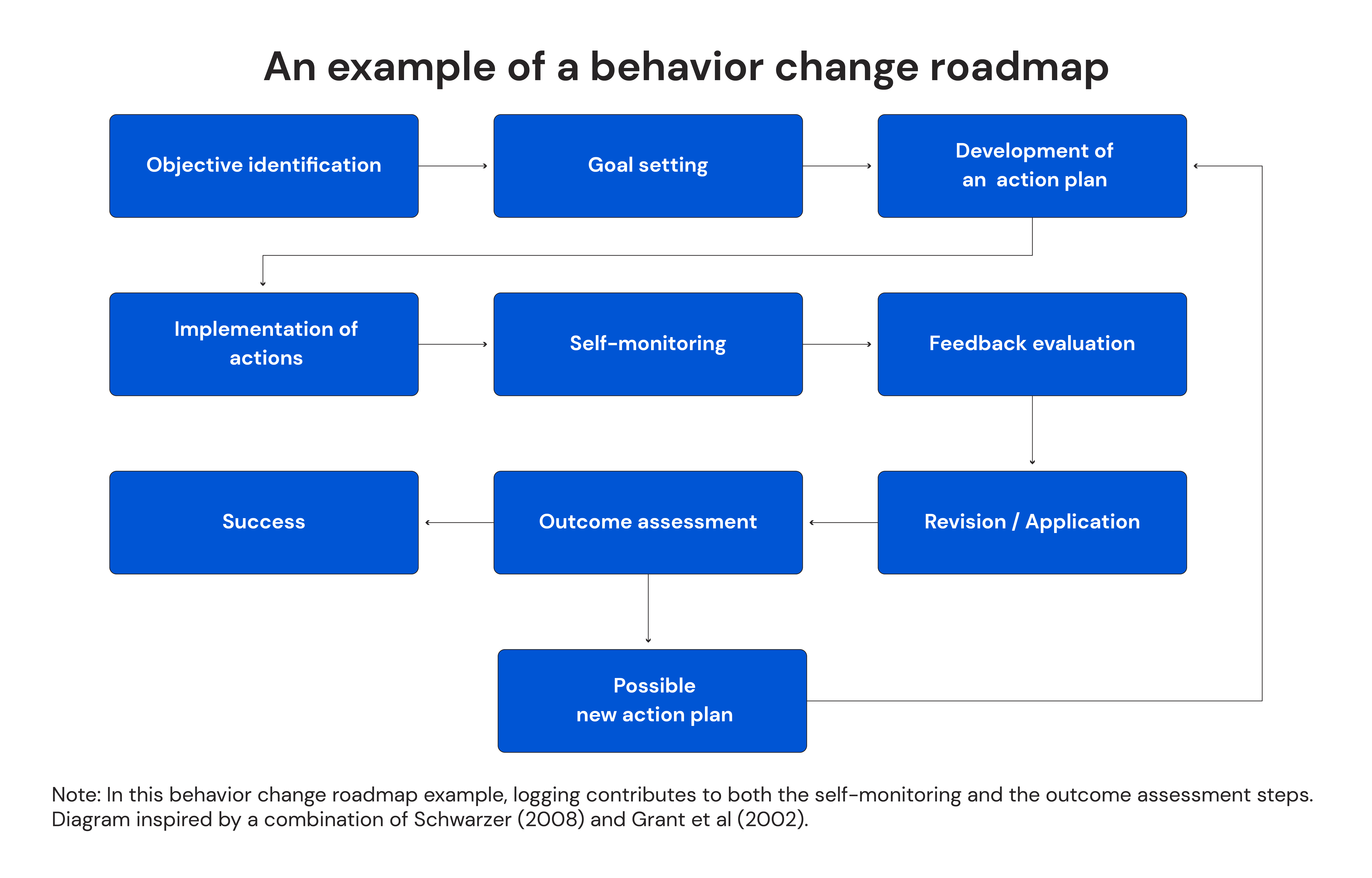
Logging is self-monitoring and self-monitoring is logging
As a behavioral strategy (in this instance, within the context of weight loss), the term “logging” falls under the category of self-monitoring. Self-monitoring is one of many behavioral change techniques (BCTs) drawn from the foundation of behavior change theory. The goal of these BCTs is to support behavioral change using precise, observable, and repeatable actions. The focus of research in this area is to determine whether self-monitoring helps people achieve their goals through awareness, feedback, and self-regulation. This raises several questions:
- Does heightened awareness help in our success?
- Does the feedback provide us with useful information?
- How does the frequency of our logging affect our progress?
- Can we use the information gained from logging to maintain or even improve our results?
Stepping back, it means we should look at logging not as a laborious act of food or scale homework, but instead as data that can be used to create a plan and evaluate progress. And since it turns out that weight loss is typically a solo project, personalized data is invaluable. While advice and support are important, the application of this knowledge rests on you. The challenge, then, is to view our data objectively, treating it as a tool rather than as an emotional burden.
To tie this segment together:
- We don’t merely log for logging sake; we log to achieve an objective, such as weight loss.
- Our goals are often tied to the desire to change our behavior, with self-monitoring playing a pivotal role in that process.
- Through self-monitoring, particularly tracking food intake and weight, we aim to self-regulate and to adjust our behavior based on the feedback received, which are all part of BCTs.
- Ideally, by effectively using this personalized data, we achieve our objectives in the best manner for ourselves.
Does logging give us an edge on weight loss or maintenance?
Throughout the remainder of this article, we will focus on the research regarding logging, looking mostly through three lenses – feedback, frequency, and consistency. The goal is to see if we can gain any value from what these factors offer us. We look first at how logging supplies us with insights, allowing us to adjust our actions to better inform our outcomes.
Awareness, lapses, and feedback allow us to take action
As discussed above, logging acts not just as a method of record-keeping, but also as a trigger for behavioral adjustment. This is where logging proves its worth. For instance, if you’ve been diligently logging your weight and you notice the trend of your weight increasing (when, according to your plan, it should be decreasing), you can use that information to adjust your dietary intake. Similarly, if you maintain a consistent food log during the week, but you notice that your lack of entries on the weekend correlates with sharp rises in your weight, you can use that to tighten up your self-monitoring efforts on the weekends. These examples depict where and when logging generates awareness of our behaviors, and feedback about the impact of our behaviors.
To clarify, awareness is the recognition of one’s behavior; it provides the foundation for recognizing the need for change. Feedback, on the other hand, is the information you receive regarding actions that were taken, offering insights that ideally lead to positive change. You can think of awareness as an internal response to external feedback. Together, these elements create a cycle of reflection that can inform the action we use in self-monitoring. Without this reflective process, logging simply remains a collection of unused data.
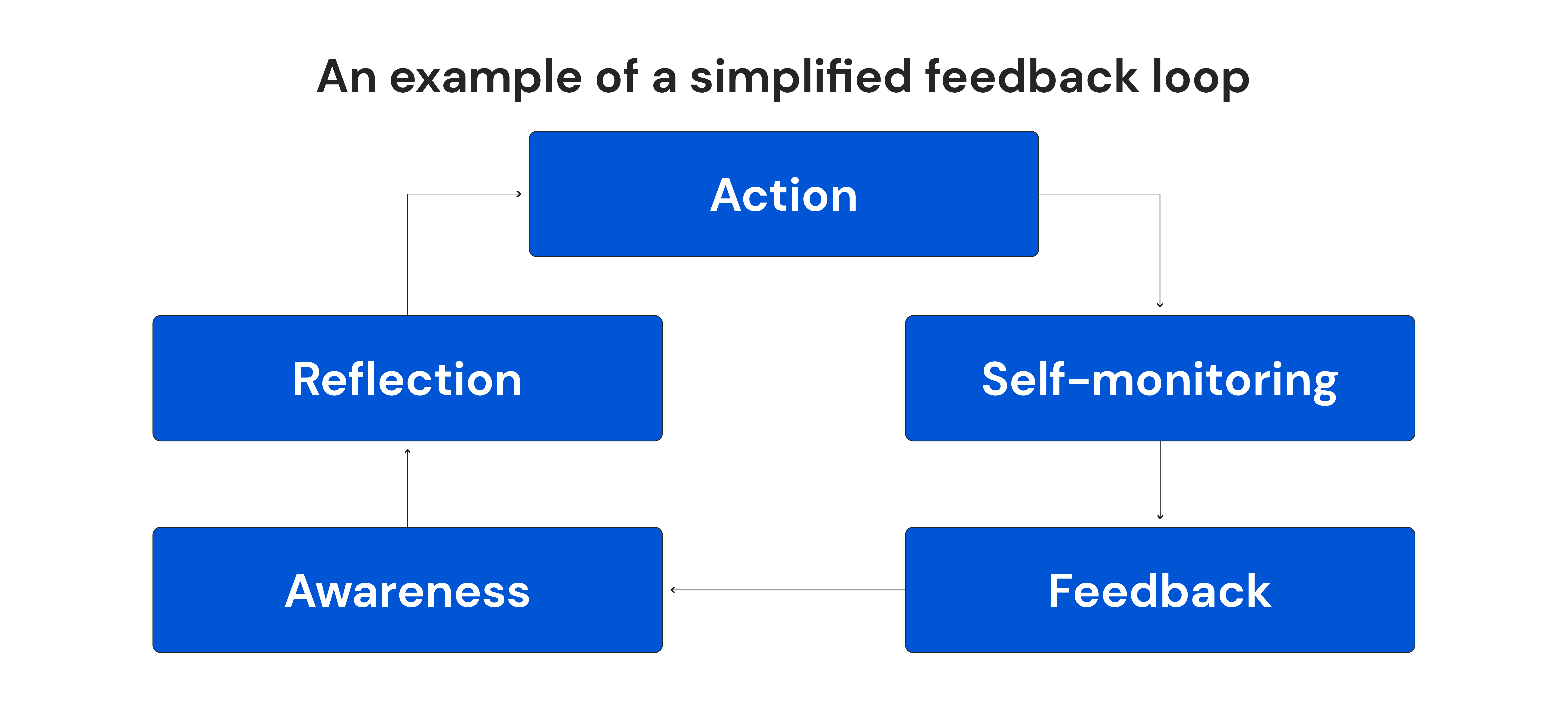
Tying this in with real-world research, Frie et al conducted an eight-week study involving participants who expressed the desire to lose weight but who did not currently participate in daily weigh-ins. Researchers had the participants weigh themselves while verbalizing their thoughts into a recorder (they called it “think-aloud”). The study’s outcome showed an overall average weight loss of -0.33kg. There was one outlier who lost 13.6kgs, who was removed from the average calculation, but it’s worth giving them some props.
The participants received no guidance or specific recommendations about dietary intake. Their sole task was to step on their scales and record their innermost thoughts, relying only on the feedback of the scale for self-awareness. It should be noted that this action alone did lead to behavioral change and self-regulation. Most participants felt that the daily weighing was a strong assistance toward weight maintenance versus weight loss. The practice seemed to serve as a reminder and had positive effects on dietary lapse behaviors, as one participant reported opting not to “have the cake at the party.” Supporting these findings, another study found that participants ate fewer snacks after weighing themselves. However, for the participants whose primary goal was to lose weight, logging weight alone did not achieve notable results in most cases.
This study highlights a very interesting point regarding awareness and feedback: information alone did not bridge the gap between intention and action. Without structured guidance or a concrete action plan, participants found it challenging to achieve the level of weight loss they aspired to. Additionally, for some, the feedback led to frustration, as some believed their efforts should have produced more results.
What one could take away from this study is that while awareness and feedback mechanisms can impart small-scale behavioral change, without action planning, more challenging behavioral shifts may be harder to attain. It could be that weighing yourself might be enough to achieve maintenance, but we could need more data, such as food logging, to move into more notable weight loss. I’ll talk about that in the next section.
To summarize what we learned:
- There can be a disconnect between our intentions and actions.
- Logging is, at the very least, an act of intention and a start in the right direction toward our objectives.
- With logging comes awareness and feedback, and that helps us identify patterns and observe short-term outcomes.
- However, without an action plan, we may not achieve outcomes with weight logging alone.
Does dietary self-monitoring lead to greater weight loss?
To answer the question posed by the section header: yes, and quite consistently.
A 2021 systematic review by Raber and colleagues summarized the research that had examined the impact of dietary self-monitoring on weight loss outcomes, within the context of behavioral weight loss interventions.
59 studies with a total of 19,029 subjects were included in the review, including 44 that used “all intake dietary self-monitoring” (i.e., some form of food journal, where participants were supposed to record everything they ate) and 15 that used “abbreviated dietary self-monitoring” (which ranged from taking pictures of meals, to recording meal patterns, to logging how frequently subjects consumed fruits, vegetables, or fast food).
In around two-thirds of studies, subjects who engaged in dietary self-monitoring lost “significantly” more weight than subjects in control groups (many of which were “active control groups,” which involved behavioral weight loss interventions that just didn’t include dietary self-monitoring). On average, subjects who engaged in dietary self-monitoring lost about 3.5-times more weight than subjects who didn’t (2.8kg versus 0.8kg).
Below, you can see the results depicted graphically. Each dot represents a control group (x-coordinate) and its corresponding intervention group (y-coordinate) from a single study. Each point below the diagonal line represents a study where subjects lost more weight with dietary self-monitoring, while each point above the diagonal line represents a study where subjects lost more weight in the control group. As you can see, dietary self-monitoring does provide a small but surprisingly consistent edge for weight loss.
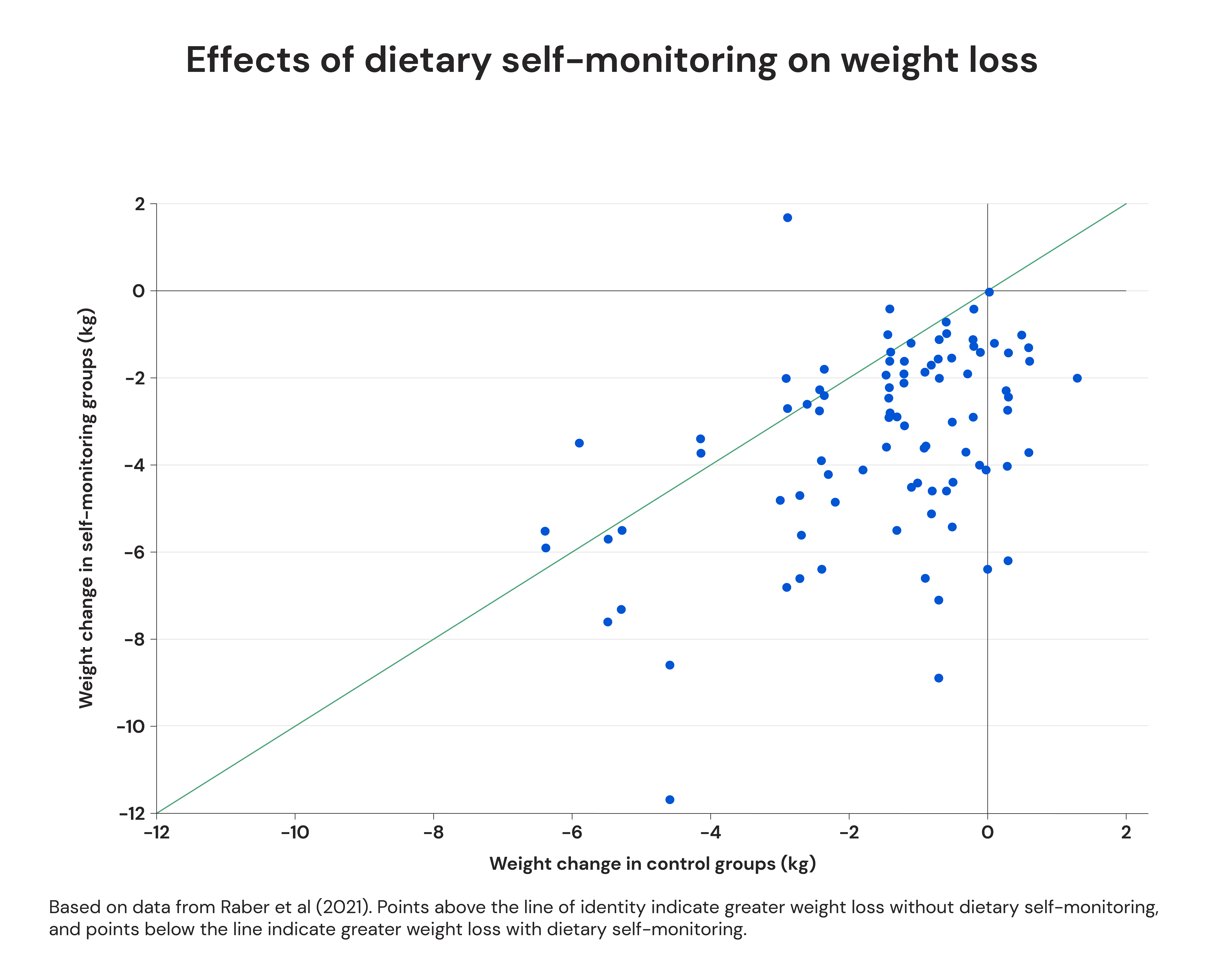
This systematic review reinforces something we all already know: weight loss is tough. The total weight loss figures – 0.8kg in control groups, and 2.8kg in dietary self-monitoring groups – don’t jump off the screen. But, it also shows that food logging does improve your probability of weight loss success, and it demonstrates that food logging typically leads to significantly greater weight loss than would have been achieved without it.
However, as I’ll discuss in more detail later, comprehensive food logging didn’t seem to be necessary for dietary self-monitoring to be effective. “All intake dietary self-monitoring” and “abbreviated dietary self-monitoring” were similarly effective for promoting weight loss. Instead, frequency and consistency of food logging seem to be far better predictors of success.
Looking at frequency and consistency in loggers
We’ve learned about the value of awareness and feedback to initiate behavioral change. Now, the questions become: how frequently and with what consistency do we need to log?
Before diving in, let’s briefly define terms:
Frequency refers to how often an event or action takes place. When applied to someone aiming to lose weight, it could pertain to how frequently they weigh themselves on the scale each week.
Consistency refers to something occuring in a reliable or uniform manner. For example, in a weight loss context, weighing yourself once per day, once per week, or once per month would all be consistent patterns of weighing.
Just to further delineate between the two terms, logging every day would mean that you were logging both frequently and consistently. Logging once per week would be consistent, but not frequent. Logging every day most of the time, but randomly taking a month off, would be frequent but inconsistent. Finally, randomly logging one day every so often, with multiple days or weeks between instances of logging, would be both infrequent and inconsistent.
There is well-established research here, here, and here, that supports the value of frequency or consistency in self-monitoring weight or food logging, leading to better weight management. So, let’s dig into it.
The frequency factor in self-weighing
A study from Vuorinen et al examined nearly 10,000 uncontrolled smart scale users over 1085 days. Without any specific intervention, these users weighed themselves at different frequencies in their everyday lives.
The result? More frequent weighing was associated with less weight gain or greater weight loss, especially in people with obesity. In fact, normal-weight and overweight users who weighed infrequently actually tended to gain a bit of weight, on average. Other studies have shown breaks in frequency have similar effects.
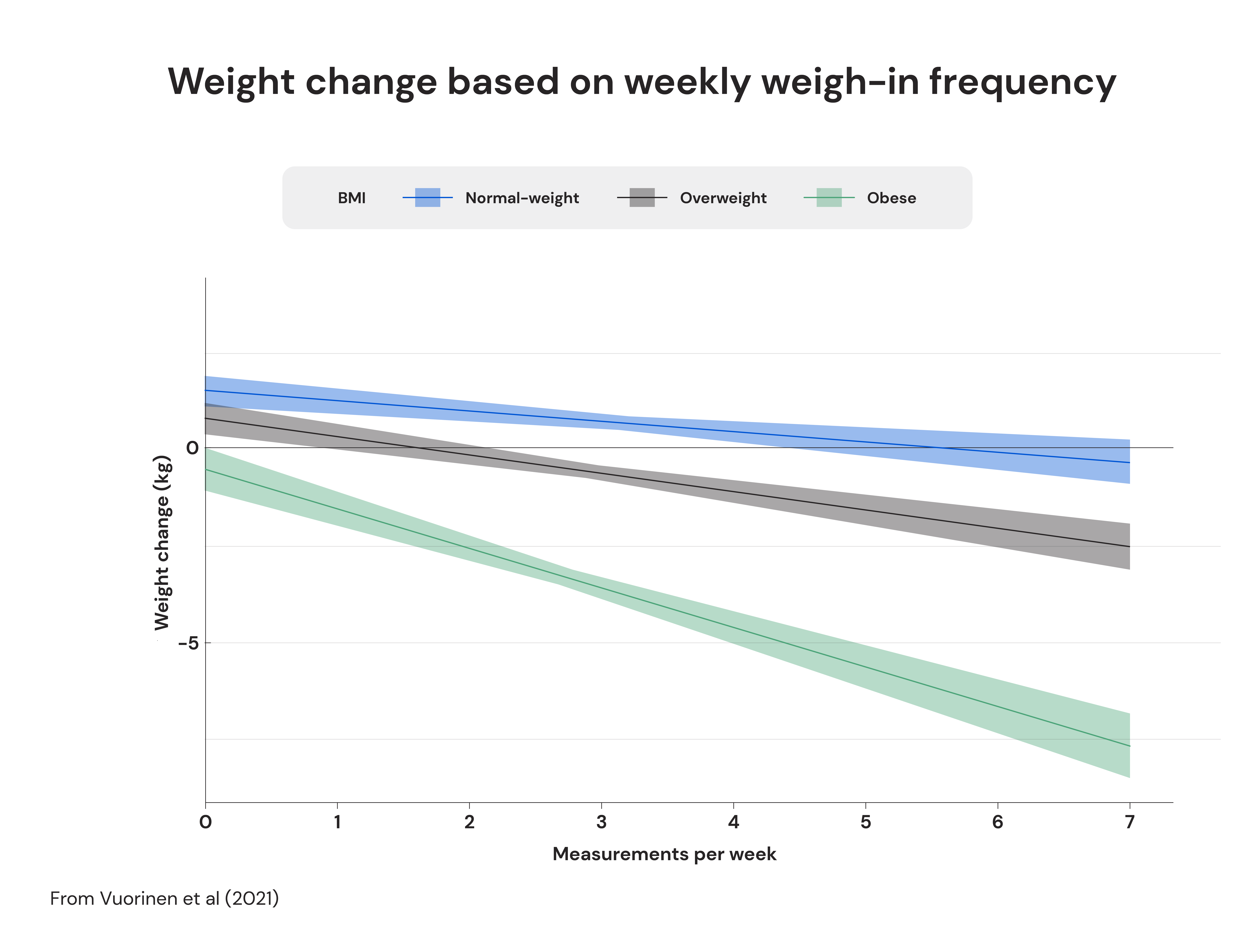
There are similarities here to the findings of the previously mentioned study by Frie et al. The biggest difference, other than participant numbers, was the time frame. Because the participants in the Vuorinen study had been weighing themselves for at least a year, they had time to transition into a more habitual routine, thus potentially becoming less negatively affected by the scale results over time.
The research also notes that individuals who “needed” to lose more weight (rated obese) experienced a greater degree of weight loss. There could be something to dissect there about the relationship between self-weighing and perceived need affecting outcomes. While the study didn’t specifically select participants based on their weight loss goals, I think it matters how we look at the “success” of this study. It’s possible those who were rated at a “normal weight” aimed to maintain and could consider maintenance as an achieved goal. Overall, this study provides further evidence that weight logging alone tends to primarily help with weight maintenance in most individuals, but frequent, long-term logging may help some people lose weight.
The frequency factor in food logging
Turning our attention to the frequency of food logging, a study by Harvey et al had subjects record their food intake using a web-based tool for six months. The researchers encouraged a “write as you bite” system for the loggers (i.e., they were encouraged to log their meals as they ate them), and provided the subjects with advice and guidance related to goal setting, behavior change, exercise, and nutrition.
They discovered that logging habits are what tipped the scales. During the first month of the study, subjects logged their food an average of 19-20 days and spent about 23 minutes per day logging their food, split across an average of 2.5 logging sessions. By the last month of the study, subjects that lost less than 5% of their initial weight only logged their food on nine days, taking less than 14 minutes to log each day, split over just 1-2 logging sessions. However, subjects that lost at least 10% of their initial weight still logged their food on an average of 20-21 days, taking 16 minutes to log each day, split across an average of 2.7 logging sessions. So, all subjects got faster at logging their food, but subjects that lost less were more likely to just log all of their food for the day in 1-2 sessions, and they logged less frequently as the study progressed. Conversely, the subjects that lost more weight were more likely to log each meal as they ate it, and they generally preserved their logging frequency across the six months.
While the frequency of logging is clearly important, other studies have found that consistency may play an even more crucial role in successful weight loss. So, let’s now turn our attention to consistency.
Consistent efforts, consistent results?
At this point in our article, we’ve examined self-monitoring studies of all flavors. These studies have a range of methodologies – some focus solely on tracking, while others prioritize the frequency of weighing ourselves versus logging food intake. With that context in mind, a year-long investigation from Ingels et al pulls all of these threads together. It involved food and weight logging, feedback, and an action plan, which means there were a lot of behavior change techniques (BCTs) present. This study offers valuable insights into the differences between consistent and inconsistent logging practices, combining the other factors we’ve been learning regarding behavior change. Let’s see how this plays out.
The study initially enrolled 66 participants, but only 45 completed the research. The exclusions were primarily due to a lack of comprehensive data. In the end, the 45 participants were 13 males and 32 females, with an average age of 61.2 years. As you can see in the figure below, not everyone had successful weight loss.
However, those who completed their food logs more consistently (at least 228 days over the course of a year) lost significantly more weight than those who logged less consistently. In other words, people who logged their weight at least four to five days per week were more successful in losing weight throughout the year.
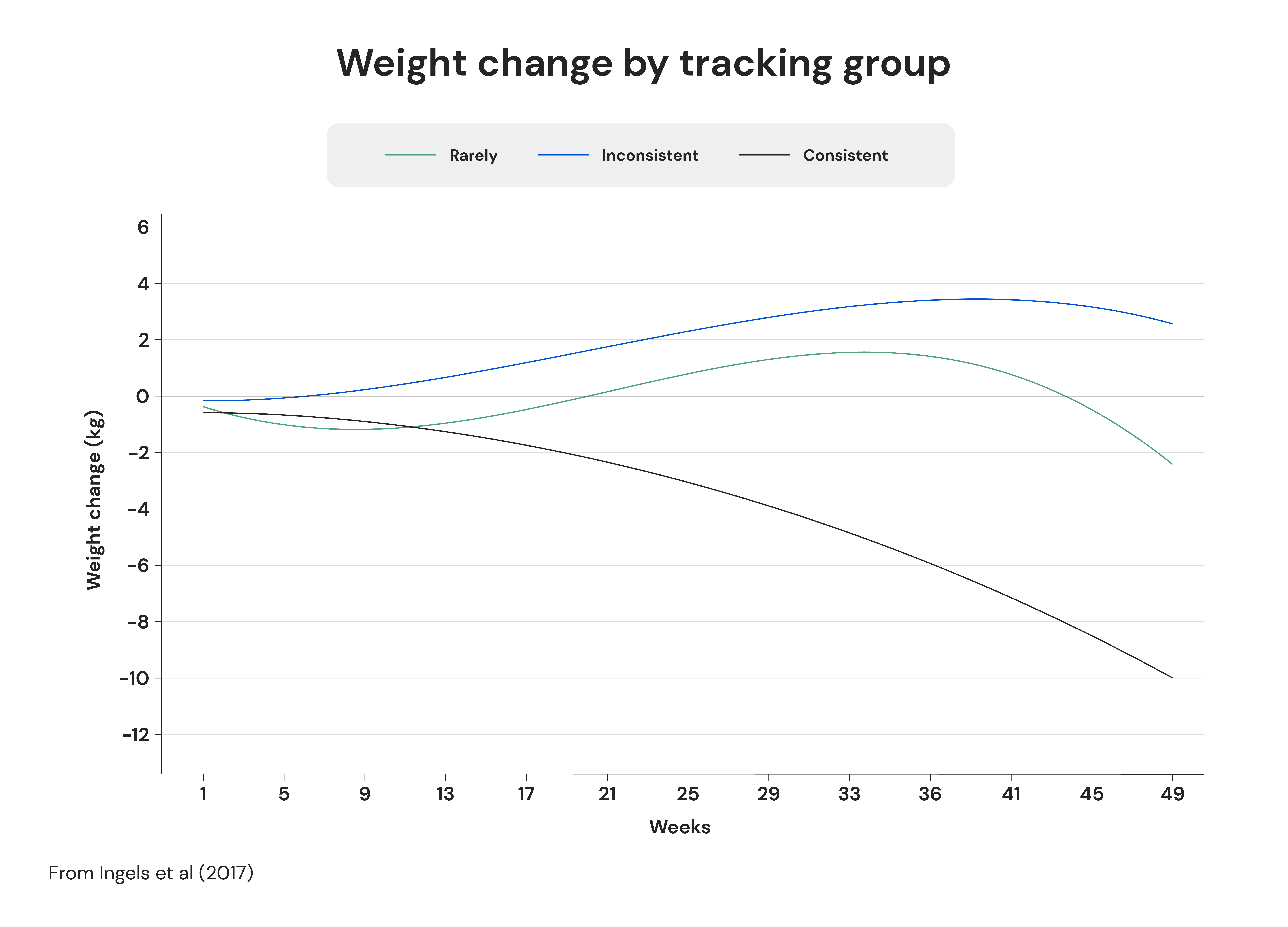
The study also found interesting patterns in those who tracked their progress during the build-up to the holiday season. As the study entered week 9, coinciding with American Thanksgiving, you’ll notice an upward trend among all groups except the group of consistent loggers. It’s possible that awareness and feedback from consistent logging may have played a role in helping certain participants stay on track with their goals.
This ties back to what we’ve seen throughout various studies: individuals with a need (of note: all the individuals in this study had type 2 diabetes), who also log consistently, receive guidance and feedback, and have an action plan seem to have a better chance at moving toward their objective. While it doesn’t guarantee success, combining these BCTs increases the chances of achieving your desired outcomes.
Maintaining results: the role of consistent logging
One consistent finding from self-monitoring studies is that self-monitoring declines over time. If we recall back to why we log, it’s mainly about catching yourself doing well or observing when you need to get off track. However, self-monitoring is a continuous act, and this is a fact that cannot be understated. Looking at data from the National Weight Control Registry, it’s evident that those who had less successful weight maintenance experienced an increase in adverse behaviors. This includes factors like a decrease in conscious efforts to restrict food intake, a reduction in self-weighing, or an increase in dietary disinhibition.
While it’s nice to think that we will all have a “check engine” light that will come on when we need it, we could argue that it’s better to have a system in place to ensure that if we drop our guard in one area, it’s likely to be caught (and hopefully quickly). This idea supports my advocacy of daily weighing and at least some monitoring of food intake, even in maintenance phases.
Addressing the details of food logging, Peterson et al conducted a study looking at the effects of food logging frequency, consistency, and comprehensiveness (the level of detail of food logs) during one year of weight loss maintenance. They found that logging frequency only had a positive impact for people who also logged consistently. Inconsistent loggers tended to regain weight, regardless of their logging frequency (during the periods they did log). However, consistent, infrequent loggers tended to maintain their weight loss, while consistent, frequent loggers tended to lose even more weight. So, consistency ultimately mattered more than frequency, and increased frequency without high consistency did not lead to significant benefits. However, the comprehensiveness of food logging wasn’t an essential predictor of weight loss maintenance, a conclusion that aligns with Helsel et al’s research, which also downplayed the importance of log detail in successful weight loss.
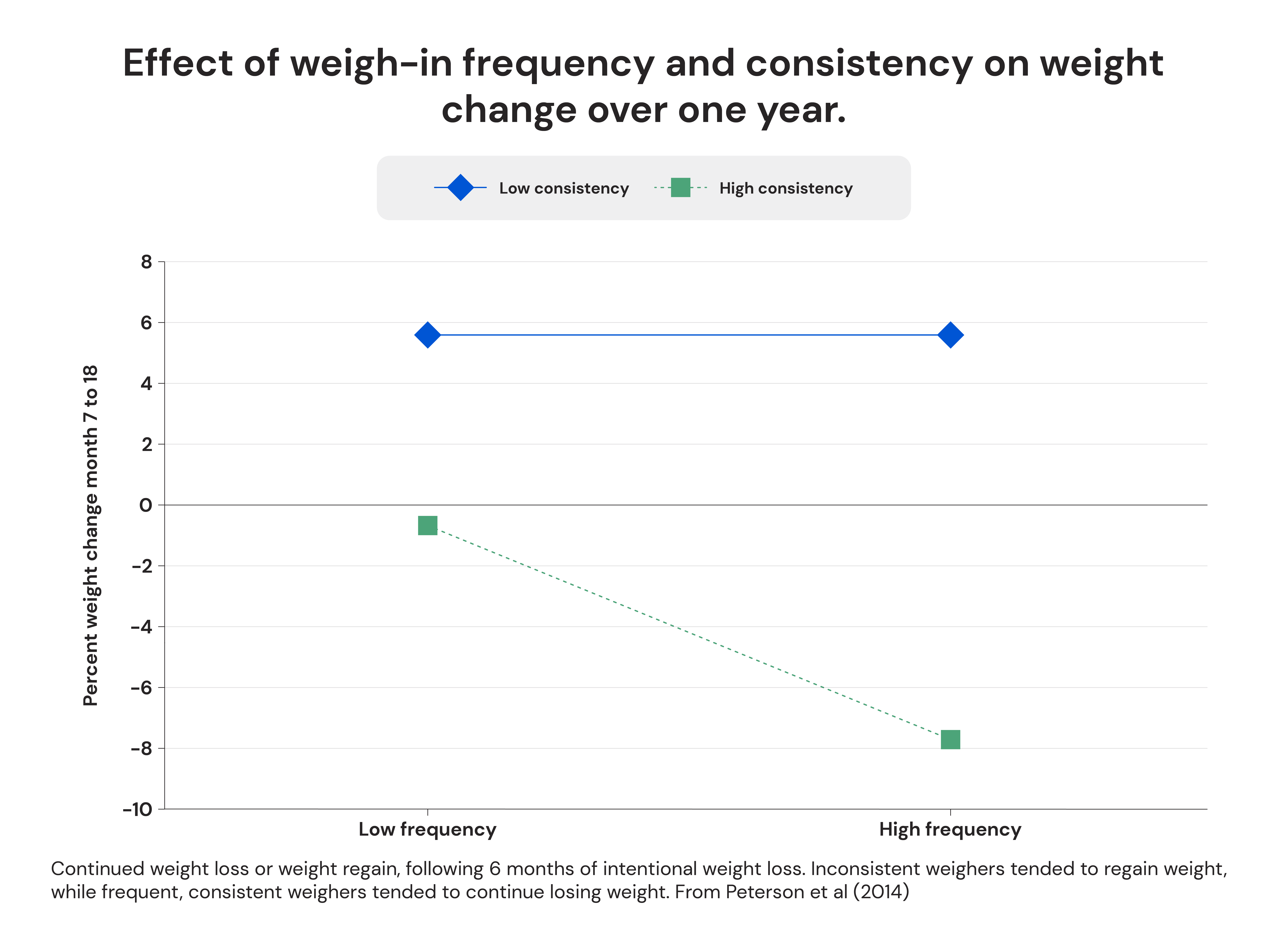
So, to get the most out of your logging efforts, the research suggests that frequency and consistency are important. But, of the two factors, consistency should be your primary concern. Logging three days per week, every week, is likely better than logging every day for two weeks and then taking a month off. But, if you can log consistently, logging more frequently will further improve your results.
However, the research also suggests that the comprehensiveness of your logging efforts is a bit less important. For instance, logging every single ingredient in a meal would provide you with a more comprehensive record than simply logging food items that adequately describe a meal (i.e. logging “300g of chili,” versus precisely logging every ingredient and every spice that went into the chili recipe), but the added comprehensiveness seems to have a smaller impact on weight-related outcomes than the frequency and consistency with which you log.
Providing a mini-recap of this section:
- Both frequency and consistency in self-monitoring are linked to better weight management outcomes. If one had an edge though, it seems to be consistency, but doing both is probably the best plan.
- Initially, more time may be needed for logging, but efficiency improves with practice.
- The more we combine BCTs, the more we increase our chances of outcome success.
- The details of our logging don’t seem to matter as much as the frequency or consistency of our logging.
Final thoughts on the efforts of logging and overall takeaways
American radio speaker and author Earl Nightingale once said, “We become what we think about most of the time, and that’s the strangest secret.” If these studies highlight anything, it’s that greatness is illuminated by glowing efforts of consistency with an action plan. I think it’s probable that a lot of individuals, sans bodybuilding competitors, don’t think about being great at weight loss. Most people tend to treat it as an inconvenience, rather than a skill that can be built with consistent effort. That said, I think even mediocre weight loss takes a decent amount of effort and consistency, and that can be a hard truth for all of us.
Overall, It’s fair to say that successful weight and food logging – and by extension, weight management – require continuous and informed effort. This is especially true for weight loss, which not only demands consistent effort but also guidance based on feedback from your efforts. With a combination of self-monitoring, feedback, and guidance, weight loss isn’t guaranteed, but you significantly improve your chances to obtain it.
Key points
- Food and/or weight logging is valuable for individuals working on weight management.
- Logging, which fits within the category of self-monitoring, has been shown to support behavioral change.
- Combining self-monitoring with feedback and awareness can be particularly beneficial for weight maintenance. Still, additional elements (ranging from weight loss needs to action plans) might be factors in achieving predictable weight loss.
- The frequency and consistency of logging matters, but of the two, consistency may be more important than frequency.
- The comprehensiveness of your logging appears to be less crucial for behavioral change than frequency or consistency.
- Successful weight management, whether toward maintenance or loss, takes continual proactive effort.
- A solid combination of logging with feedback, guidance, need, and consistent effort seems to be the best predictor of weight loss.





